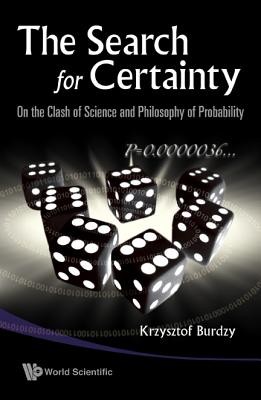
- We will send in 10–14 business days.
- Author: Krzysztof Burdzy
- Publisher: World Scientific Publishing Company
- Year: 2009
- Pages: 255
- ISBN-10: 9814273708
- ISBN-13: 9789814273701
- Format: 14.7 x 22.9 x 2 cm, hardcover
- Language: English
- SAVE -10% with code: EXTRA
Search for Certainty, The: On the Clash of Science and Philosophy of Probability (e-book) (used book) | bookbook.eu
Reviews
Description
This volume represents a radical departure from the current philosophical duopoly in the area of foundations of probability, that is, the frequency and subjective theories. One of the main new ideas is a set of scientific laws of probability. The new laws are simple, intuitive and, last but not least, they agree well with the contents of current textbooks on probability. Another major new claim is that the "frequency statistics" has nothing in common with the "frequency philosophy of probability," contrary to popular belief. Similarly, contrary to the general perception, the "Bayesian statistics" shares nothing in common with the "subjective philosophy of probability."The book is non-partisan on the scientific side -- it is supportive of both frequency statistics and Bayesian statistics. On the other hand, it contains well-documented and thoroughly-explained criticisms of the frequency and subjective philosophies of probability. Short reviews of other philosophical theories of probability and basic mathematical methods of probability and statistics are incorporated. The book includes substantial chapters on decision theory and teaching probability, and it is easily accessible to the general audience.
EXTRA 10 % discount with code: EXTRA
The promotion ends in 20d.17:30:53
The discount code is valid when purchasing from 10 €. Discounts do not stack.
- Author: Krzysztof Burdzy
- Publisher: World Scientific Publishing Company
- Year: 2009
- Pages: 255
- ISBN-10: 9814273708
- ISBN-13: 9789814273701
- Format: 14.7 x 22.9 x 2 cm, hardcover
- Language: English English
This volume represents a radical departure from the current philosophical duopoly in the area of foundations of probability, that is, the frequency and subjective theories. One of the main new ideas is a set of scientific laws of probability. The new laws are simple, intuitive and, last but not least, they agree well with the contents of current textbooks on probability. Another major new claim is that the "frequency statistics" has nothing in common with the "frequency philosophy of probability," contrary to popular belief. Similarly, contrary to the general perception, the "Bayesian statistics" shares nothing in common with the "subjective philosophy of probability."The book is non-partisan on the scientific side -- it is supportive of both frequency statistics and Bayesian statistics. On the other hand, it contains well-documented and thoroughly-explained criticisms of the frequency and subjective philosophies of probability. Short reviews of other philosophical theories of probability and basic mathematical methods of probability and statistics are incorporated. The book includes substantial chapters on decision theory and teaching probability, and it is easily accessible to the general audience.


Reviews